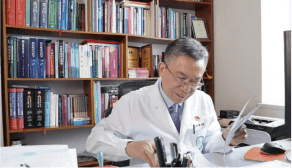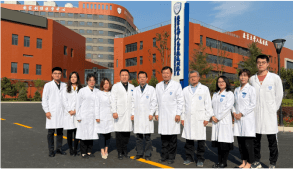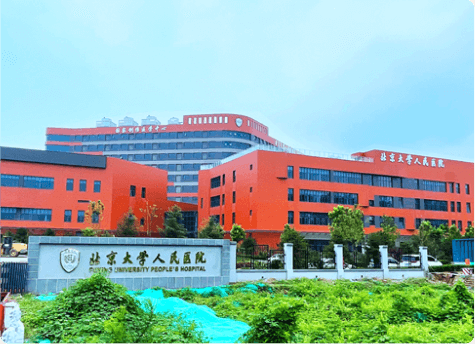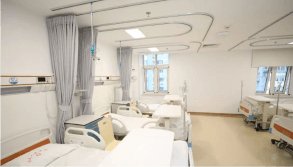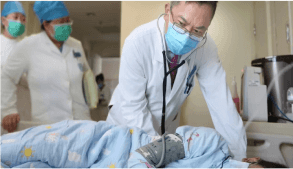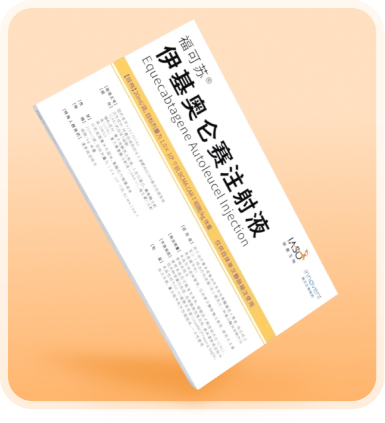Since 2005, Peking University Institute of Hematology has ushered in a new stage of rapid development. The number of clinical beds has gradually expanded, the number of outpatient visits and hematopoietic stem cell transplantation has increased significantly, and a series of basic and clinical research results have been achieved. At present, Peking University Institute of Hematology has more than 420 medical, nursing and scientific researchers, including 15 with senior titles, 24 with deputy senior titles, 8 doctoral supervisors and 9 master supervisors. The hematology department is composed of hematopoietic stem cell transplantation wards, general hematology wards, outpatient clinics and clinical diagnostic centers. The total beds expanded to more than 370 beds, including 260 beds in the stem cell transplantation wards (including 81 laminar flow beds). At present, the laboratory is composed of flow cytometry and molecular biology laboratory, cytogenetics laboratory, HLA matching room, bone marrow morphology and pathology laboratory, cell collection and cell therapy room.
At present, Peking University Institute of Hematology is a key discipline of the Ministry of Education and the Ministry of Health, a national key clinical specialty, a national clinical drug research base, 211 engineering clinical key discipline, the first clinical medical department of the innovation team evaluated by the Ministry of Education, the innovative team of the new diagnosis and treatment of leukemia in the key areas of the Ministry of Science and Technology, the innovative research group of the National Nature Fund Committee, the national talent training base, the Beijing key laboratory of hematopoietic stem cell transplantation for hematological diseases, and the engineering laboratory of cell therapy in Beijing. In 2007, it has been supported by a number of funds including national science and technology major projects, and has successively assumed more than 30 funds such as the National "863" Fund, Science and Technology Support Program Project, National Natural Science Foundation, Ministry of Health Fund, Doctoral Program Foundation of Ministry of Education, "985" Fund, "Talents in the New Century" and 211 Foundation of Peking University. Professor Xiaoyun Huang, the current director, is a recipient of the National Fund for Outstanding Youth in Natural Sciences and PI of Peking University-Tsinghua United Life Center. Under his leadership, the department has made innovative achievements in clinical and applied basic research, and has published nearly 300 academic papers in the past 5 years, including more than 100 papers on SCI (including several articles published on the top journals NEW ENGLAND, JCO, BLOOD, LEUKEMIA, HAEMATOLOGICA, BBMT, BMT and other top journals in the field of blood and hematopoietic stem cell transplantation).
The department is characterized by the diagnosis and treatment of hematological malignancies and hematopoietic stem cell transplantation.
At present, the department has established a standardized diagnostic platform for high-level hematological malignancies in China, especially the multi-parameter flow cytometry, chromosome FISH detection and real-time quantitative PCR for monitoring of disease-related genes in the department, which have reached the advanced international and domestic leading high level, and the department has the ability and foundation to lead the establishment of a multi-center standardized diagnostic platform in China. On this basis, the diagnosis and treatment of leukemia in the department is more standardized, and the stratified diagnosis and treatment of the patients are carried out to further improve the efficacy. In the department, advanced molecular and genetic testing techniques are used to standardize targeted therapy for chronic myelogenous leukemia. More new drugs and combinations of new regimens are used in the treatment of myeloma and lymphoma, further improving the efficacy. In addition, in the aspect of coagulation, the department has also made great progress in recent years, the coagulation test items have been more perfect, and a new treatment program for difficult diseases has been developed, and good efficacy has been achieved. In erythrocyte diseases, we have established a standardized diagnosis, prognostic assessment model and pathogenesis of MDS, and perfected the examination of erythrocyte system diseases.
- Mainly conducts clinical and laboratory studies on multiple myeloma, primary systemic amyloidosis, lymphoma, cellular immunotherapy, etc.
- Director-General and Standing Committee of Hematology Branch of Chinese Physicians Association
- President of Hematologists Branch of Beijing Physicians Association
- Vice Chairman, Professional Committee of Multiple Myeloma, and Vice Chairman, Professional Committee of Histiocytic Diseases, Chinese Medical Doctor Association
- Vice President of Hematology Branch of Chinese Geriatrics Association and Chairman of Academic Committee on Multiple Myeloma
- Associate Leader, Plasma Cytology Group, Hematology Branch, Chinese Medical Association
- Associate Leader, Multiple Myeloma and Related Diseases Group, Hematology Committee, Chinese Association of Female Physicians
- Member of the China and International Collaborative Group on Primary Systemic Amyloidosis
- Member of the International Myeloma Working Group, Asia-Pacific Myeloma Working Group
- Member of International Research Group on Renal and Monoclonal Immunoglobulinopathies


